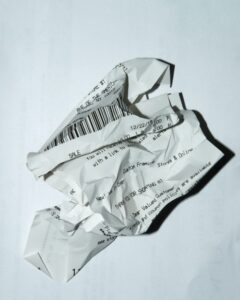Ban to stop 11.2 billion harmful till receipts heading to landfill
We crumple them, shove them in coat pockets and find them forgotten in shopping bags every day – the humble receipt may not seem like a big problem, but waste collection company BusineseWaste.co.uk says paper receipts should be banned to stop them heading to landfill.
Over 11.2 billion paper till receipts are printed each year by retailers in the UK – a staggering number that generates enough paper to reach to the moon and back. Shoppers are increasingly conscientious about their recycling habits, meaning that a large number of these pieces of paper are thoughtfully discarded into paper recycling. But BusinessWaste.co.uk say this is not quite as helpful as it seems – concerningly, till receipts are not only non-recyclable in most cases, they’re also potentially harmful.
Despite this, UK shoppers are overwhelmingly unaware, with 95% saying they believed receipts were recyclable in a study undertaken by BusinessWaste.co.uk. Just 1% of the 2000 people surveyed knew they were non-recyclable, with 4% unsure either way.

Common responses from survey takers included:
“Yes – it’s paper!”
“If I remember to take them out of my wallet, they go straight in the recycling.”
“I usually chuck them in the on-street recycling bins as soon as I leave the shop.”
Although well-meaning, these shoppers could be adding to a bigger problem – and one which BusinessWaste.co.uk says requires a receipt ban altogether.
About half of receipts are printed of a special type of paper which reacts to heat. The till ‘printer’ contains no ink, but rather heats the paper in the pattern needed to make the text appear: a clever trick, but one which hides a more worrying fact.
This thermal paper contains two chemicals, known as BPA and BPS, which are classed as toxic to people and the environment – so much so, that plastic water bottles are no longer allowed to contain these harmful chemicals, which can cause hormonal changes and have been linked with a risk of cancer. Yet millions of pieces of paper containing both BPA and BPS find their way to both landfill and recycling centres each year – contaminating the other waste or releasing the dangerous chemicals into the air.
Mark Hall, spokesperson for BusinessWaste.co.uk, said the solution is simple.
“We simply need to ban receipts altogether. Most people find them annoying as it is – how often do we throw them in the nearest bin as soon as we exit a shop or, equally wastefully, decline them after they’ve been printed, leaving till staff to throw them away?
“Some retailers have introduced electronic receipts, sent by email, and we think this is a great alternative, particularly as it makes it easier for consumers to find if they did need to return or check the warranty on a product. It could also be done by text or QR code, giving consumers the option to decline the receipt altogether or enter their details to get it sent to their phone or emails.
“For those who need to collect receipts for expense or tax purposes, having digital receipts would save bulging files with scraps of paper for long-suffering accountants to sift through at the end of the year – it’s a win-win. For those who don’t need to save each one, more retailers need to give customers the option to say no to pointless pieces of paper – or offer environmentally friendly alternatives.
“We’re aware that some retailers have shifted towards using a different type of paper in their receipts which is recyclable, but we think this is just creating another form of waste that enters the recycling process: it’s usually entirely unnecessary.”
Have your waste collected
Get a fast FREE quote for your waste collection 0800 211 83 90
- Free quote within 1 hr
- Any type of waste
- FREE bins and delivery
- We cover all of the UK